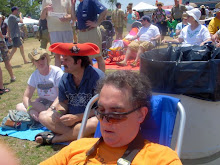Are Jurors Competent to Do Their Job?
I received a recent comment from Joshua Karstendick, which I thought I should answer in a new post:
"I understand the Framers' reason to keep citizens as a check on the government's power, but doesn't it make you the least bit nervous to allow the fates of legal cases to be determined by ordinary folk? I mean, these people have no legal background. You know what they say, half of all people are below average."
"Speaking of which, do you know of any real data on juries as to their demographics and education?"
First, let's look at whether jus' plain folk are capable of determining the outcome of legal cases. It is true that they have no legal background, but that may be as much of an asset as a liability.
Let's put jury nullification - the prerogative of a jury to acquit on extralegal grounds - aside for the moment. The job of a juror is to determine what the facts are, and then apply them to the law as they are instructed by the court. This requires, primarily, the determination of who is lying, and who is telling the truth - credibility.
Telling the Truth
In his book The American Jury System, New York Law School Prof. Randolph Jonakait quotes a statistic that the average person can tell whether someone is lying or not with an accuracy of 54%. Not much better than a coin toss.
With training and practice, that number can be raised. How high? According to the studies Jonakait cites, only as high as 57%. So the judge's training and experience aren't worth any more than three percentage points.
But wait! Judges have experience(which may result in nothing more than ingrained mistakes), yes. But training? Hey, they went to the same law schools as other lawyers, and Judging Credibiity 101 was not on the curriculum. So the alternative to a jury may be no better, and often worse.
Complex Evidence
In cases with engineering, scientific, financial, or other technical evidence, a jury is likely to do much better than a judge. To quote Duke Law School Prof. Neil Vidmar, lawyers tend to be highly literate - but barely numerate. The chance of getting one or more people who understand technical evidence on the jury (and can explain it to the rest) are far higher than that of having a CPA, engineer or physicist on the bench. So juries are more, not less, likely to understand complex evidence than are judges.
Jury Nullification
The next question is whether jurors are competent to decide whether to nullify? Of course, that is a question of ethics. A juror should be able to tell whether a conviction would or would not be unconscionable without any specialized education or training. In fact, it would seem that lawyers and judges often get hardened to injustices, and may be willing to accept injustices that the lay public would be repelled by. After all, this is a question of right and wrong - and if a person isn't able to tell right from wrong, they are legally insane (at least by some tests) and should be disqualified from jury duty!
Finally, as for the education level of jurors: Harry Kalven and Hans Zeisel, in their landmark study The American Jury, found that jurors were, statistically, slightly above the national average for education - at that time, 12.3 years of schooling as opposed to 11.6 years, for the average. This makes sense: those who are ineligible for jury duty tend not to be at the top of the heap, and are weeded out.
Now, motor-voter programs and other programs to diversify the jury pool may have brought the jury closer to average, as many employed people do everything they can to "duck out" of jury duty. The answer is not to disparage or discard the jury, but to put some teeth in the jury summonses - and, perhaps, to pay jurors at least minimum wage. Jury service is the best opportunity most of us have to participate in our government. It is abysmal that so few of us want to take advantage of this opportunity.
The alternative to trial by jury is trial by judge. A jury provides a consensus judgment of diverse elements of the community; a judge provides one jaded perspective. A judge will not have twelve lifetimes of experience, or the educations of twelve individuals, to bring to the job.
Well, Joshua, I hope this answers your questions.


2 Comments:
It does indeed. Thank you.
Excellent post - extremely informative. I was wondering if you have any thoughts on what I have seen described elsewhere as the "CSI effect" - jurors unrealistic expectations concerning forensic evidence and investigative procedures. In these news accounts, prosecutors claim that jurors are coming to expect the kind of high-tech wizardry and exhaustive police work they see on TV and the movies, and when real world evidence doesn't measure up to this fictitious standard, they feel reasonable doubt exists. Is there any basis to this, or is it an exaggeration?
Post a Comment
<< Home